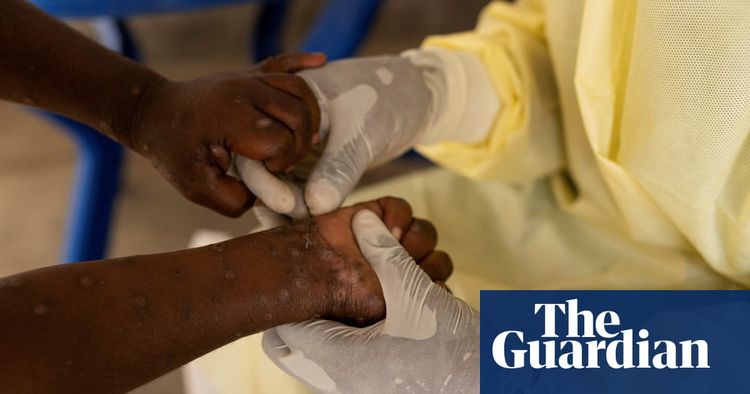Mpox outbreak in Africa is public health emergency resembling early days of HIV, says WHO

Scientists have compared the recent outbreak of mpox in Africa to the early stages of the HIV epidemic. The World Health Organization has officially declared it a public health emergency.
Healthcare professionals are urging for a faster implementation of testing, vaccines, and treatments in the regions affected by the virus. They also recommend starting initiatives to decrease discrimination and judgment towards those with the virus.
Additional research materials were deemed crucial by experts, who highlighted the significant uncertainties surrounding a novel strain circulating among individuals in the Democratic Republic of the Congo. By 4 August, Africa had recorded a total of 38,465 cases of the new virus and 1,456 fatalities since the beginning of 2022, with the DRC alone reporting over 14,000 cases and 524 deaths this year.
The virus has been classified into different groups known as clades I and II, along with a recently discovered clade called Ib. Clade Ib is a variation of clade I and seems to be the main cause of the outbreak in the Democratic Republic of the Congo and surrounding areas, posing a higher risk to children.
The World Health Organization stated that the outbreak was severe enough to warrant a declaration of a "public health emergency of international concern", a classification previously utilized for Ebola outbreaks, Covid-19, and a surge of mpox in Europe in 2022.
The head of the WHO, Tedros Adhanom Ghebreyesus, expressed deep concern about the situation, stating it was of great concern and required the utmost level of alertness according to global health regulations. He specifically pointed out the appearance of clade Ib in the eastern part of the Democratic Republic of the Congo and its presence in nearby nations.
The World Health Organization has used $1.5m from its emergency fund and intends to provide additional funds. They are asking for donors to contribute towards the remaining $15m necessary for their work in that area.
Trudie Lang, a global health research professor at Oxford University, mentioned, "Many individuals have compared this situation to the early stages of the HIV epidemic."
She explained that the virus seemed to be spreading mainly through sexual connections, especially putting young, vulnerable sex workers at a greater risk. Due to the strong social disapproval surrounding the virus, it was important to educate the public through health campaigns so that they knew to seek treatment.
Lang mentioned that although the data has not been fully examined and released, the healthcare workers she spoke with mentioned a significant increase in instances of pregnancy loss caused by the virus. There have also been reports of babies being born with mpox lesions as a result of transmission in the uterus. Lang highlighted the presence of many uncertainties, such as the extent of cases occurring outside of hospital settings.
Lang expressed concern about the number of cases that are not serious. He was particularly worried about individuals who may have a mild infection, especially if it is a sexually transmitted genital infection, because they may not be aware that they are carrying it.
The main issue we are trying to figure out is when does the virus spread the most, and when is it being passed on to others?
Lang mentioned that if the virus spread to Europe or the US, it could likely be controlled with vaccines, similar to the 2022 mpox outbreak. He expressed concern that while the virus may spread quickly in Europe, it may not be contained as easily in less wealthy regions of Africa.
Dr Ayoade Alakija, who leads the Africa Vaccine Delivery Alliance and the Diagnostics non-profit organization Find, stated that if the outbreak had occurred in Europe, mpox would have been deemed a significant global health emergency by now. She emphasized that this declaration should prompt action and increase funding to improve the slow response to the situation.
Alakija emphasized the importance of conducting further research to grasp the transmission patterns of mpox and to develop effective control measures and response strategies. She also stressed the need for improved monitoring and fair distribution of vaccines, tests, and treatments for all affected groups. Alakija also pointed out that currently, most of the vaccines and treatments have already been reserved by wealthy nations, and there is only one diagnostic test available so far.
If everyone can't easily get tested, we don't know how diseases like HIV will affect the seriousness and spread of mpox. Ignoring the virus in the Democratic Republic of Congo has caused it to inevitably spill over into nearby countries. The longer we wait to take action, the more likely it will spread throughout Africa and other parts of the world.
The Africa Centres for Disease Control and Prevention (Africa CDC) declared mpox as a public health emergency earlier this week. Dr. Jean Kaseya, the director general of the organization, emphasized that this declaration was not just a routine procedure, but a strong call to take action. He stressed the need for proactive and aggressive measures to control and eradicate the virus.
In reaction to the announcement, Dr. Boghuma Titanji, who works as an assistant professor of medicine at Emory University in Atlanta, expressed her desire for African governments to provide funds to combat the outbreak.
The African Union agreed to provide $10.4 million in funding for Africa CDC's efforts in early August, but Kaseya has proposed that the continent will actually require around $4 billion.













































